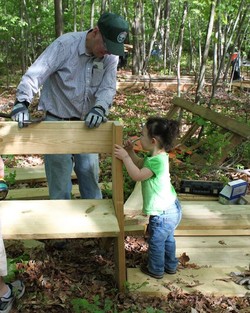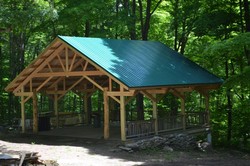For the past 25 years a group of alumni, staff and friends of Holmes Presbyterian Camp in New York have been volunteering for a work project weekend each summer.
This year they wanted to do something special for the place and space they love. It’s where many had their first formative faith experiences, and where they began to come to grips with life and death.
The first two years the group gathered, their reunions were born out of tragedy.
When they first heard the news, “Keith Miller, a staff alumni member is dead, he drowned in Florida,” they were mostly in their 20’s. Understandably, it sent a jolt through the youthful group.
They felt the need to be together, to do something, that first year, so they improved the Lakeside cabin that Keith had loved.
The following year there was more death— another young staff alumni killed in a tragic farming accident.
Sang Park, the planning and fund raising team leader for this year’s work project, remembers how he felt when his phone rang.
“I was alone in my apartment,” he says. “I was sad, angry, bitter, frustrated. Peter and I were close, we’d directed the waterfront together one summer.”
Once again Park and other alumni returned to Holmes and upgraded the waterfront with a low fence.
They’ve been coming back ever since to do work projects.

From generation to generation: Sang Park works alongside granddaughter of former Camp Holmes interim acting director William Key. —Courtesy Holmes Presbyterian Camp
Some projects, like constructing a bell tower, or blowing up deteriorated cabins, “were exciting,” says Park. And he remembers others, such as clearing a hiking trail, or replacing shingles on cabin roofs, “were simple, yet fun and satisfying.” Then there were those, like cleaning out cabins that were “somewhat mundane.”
“Being part of a group like this grounds you in your faith,” says former camp counselor and lifeguard, Mark Hostetter.
“They know you and love you—through the good and tragic things that happen.”
Hostetter’s father Don was executive director at Holmes when the decision was made, after the first two years, to make the work project annual event.
“I lived at camp all summer long,” says Hostteter (Mark). “The faith formation that happened for us is remarkable. It sustains us in time and through life, even when we’re not at camp. To me that is the wonder of the experience.”
Hostetter says many of the alumni staff and friends had their first significant faith experience at Holmes, in the old Scudder cabin. That space became “a thin place” of sorts where they “felt closer to God,” he says.
Built by the civilian conservation corps during World War II, the building was used to watch subs off the coast of Long Island.
“It was a campers cabin, right there on Denton Lake,” says Holmes executive director Peter Surgenor. “The alumni remember the lakeside conversations, and the campfires in the fireplace.”

Volunteer alumni not only built—but raised $21,000—for their 25th anniversary “Raising the Scudder Roof” project completed in May. —Courtesy Holmes Presbyterian Camp
About five years ago, the alumni volunteers took the old cabin down, creating an open platform, where they built a deck with railing. It gave the camp additional space for programming and conversation. But it was being underutilized because of its exposure to the elements including intense sun and heavy rain.
The volunteers decided on their 25th anniversary to turn the open space in the woods into a pavilion by putting a roof over it. Naming it the “Raising the Scudder Roof” they also raised $21,000 to pay for the materials they would need.
“They have a pretty sharp investment there,” says Surgenor. “It’s not just dollars and cents, it’s emotional as well.”
“I still look back and ask, ‘Why was it that I needed to be part of taking on a project to remember the loss of friends?’” muses Park. “Why is that a memorial service was good enough to move on? I may never know the answer.”
He wonders if it was the “feeling good” after completing a project, or “the satisfaction” that physical labor results in something one could be “proud of.”
Or maybe it was that these camp friends eventually became like an extended family—70 to 100 people sharing bi-annual Thanksgiving celebrations.
“Together we prepare, cook, serve, partake, cleanup, do dishes, dance, laugh, with all layers of generations, young and old,” says Park. “Initially, those first two years, it was a way to build something—and not just watch something go missing.”
“But now it is about knowing, or maybe it just hope—someday this [the camp projects] might improve or touch some lives of younger generations.”

